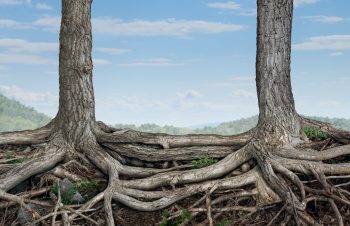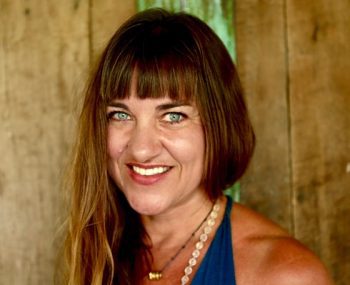By Lissa Rankin
Guest writer for Wake Up World
When I came back from Bali after the US presidential election, I took a several month hiatus from Facebook because I couldn’t tolerate all the hateful, polarizing energy I felt on both sides of the left/right divide. Even off Facebook, I felt pain in my community. I live in Marin County in the San Francisco Bay area, and a lot of people here consider themselves progressive, loving, and “spiritual.” And yet everywhere I went, I felt this intense hateful energy aimed at Trump voters. While I am not a Trump supporter, I also am not a hater of those who do support him. In fact, my shock at the fact that half of my fellow Americans voted for him made me more curious than upset. Nobody can deny that Trump never even tried to hide his blatant racism, misogyny, narcissism, greed, and childish immaturity. If anything, he was prideful and even rebellious about his behavior and his points of view. Yet that didn’t stop half of our country from voting for him.
Aren’t you curious about this? I certainly am.
What I witnessed during the election, and ever since, is a divided nation. One woman told me that she and her husband have often voted on opposite sides of the left/right polarity, and yet it has never been a problem. In this election, it became very emotional and personal for people. She and her husband are getting divorced. Their voting choices led to irreconcilable differences between the couple. They just couldn’t forgive each other for having different points of view.
[pro_ad_display_adzone id=”110028″]
What is that all about? Don’t you want to know?
I started asking Trump voters, “What’s it like to be you?” and their answers surprised me. It became very obvious that something was hurting in half of the people in our country, and whatever was hurting was more important to Trump voters than choosing a President who isn’t racist, misogynistic, greedy, narcissistic, or immature. These people had needs that were not getting met, and as a country, we were not tending to these needs. These people took their unmet needs to the voting booth and took a risk. They were essentially saying, “Well anything is better than the status quo, so we might as well try something different, even if he’s a loose cannon.”
People with unmet needs get easily triggered, and when we’re triggered, we have a tendency to polarize.
The Human Tendency to Polarize
As humans, we are mammals, which means we have nervous systems that go into stress response when we feel threatened, and when we’re in stress response, we make fear-based decisions and separate ourselves from love and Oneness. (This is the whole basis of my book ‘The Fear Cure’.)
Lisette Schuitemaker from the intentional community Findhorn says that when we make people who don’t agree with us the “other”, we start “enemy-making”. This human vulnerability cuts us off from empathy and interrupts our ability to ask, “What’s it like to be you?” When we can’t feel what it’s like to be someone else, we feel like it’s OK to say and do hurtful things. This is how we can rationalize closing our borders to humans who are having their basic human rights to safety and survival violated. When we aren’t getting our own needs met, the survival instincts of our mammal bodies go into a mode of protection rather than empathy, and we start thinking, “It’s all about me. I have needs that aren’t getting met, so who cares about those Syrian refugees. Not my problem. They are “other”.” Then you go to the voting booth and cast your vote with only your needs in mind, and if someone casts a vote different than yours, you polarize, separating yourself and seeing them as “other” too.
But sweethearts, there is no “other!” Yes, from one point of view, my human body is separate from your human body, and if food is going into my mouth but not yours, it affects us differently. But from a more expansive point of view, we’re like aspen trees, connected at the roots, all part of one human family, and if you’re not getting food in your mouth, it hurts your body, which harms the larger body, which hurts me too. I need to care whether you’re getting food in your mouth as much as I care about getting food in mine. Otherwise, the larger human body of which each of us is one necessary cell breaks down. We are seeing that on a global scale right now.
When our needs aren’t getting met and we lose the ability to ask “What’s it like to be you?”, we become narcissistic. “It’s all about me.” We can’t feel what it’s like to be you, so we stop caring about you getting your needs met. This makes us vulnerable to isolation, judging, and polarization. This makes us capable of bombing other humans because we care more about getting our needs met than about meeting the needs of others. It makes people capable of insane levels of greed and all forms of physical and emotional violence, because we don’t care what it’s like to be you. We only care about ourselves. Then, if you don’t agree with me, we’ll have a tendency to polarize, and when we’re in polarity, there’s no love. There’s no Oneness. There’s no empathy.
It Can Hurt to Have Empathy
I’ve been reflecting about this a lot lately. How is it that so many supposedly “spiritual” people in our communities have turned so hateful against those with different points of view? Why have we stopped caring about what it’s like to be in someone else’s body?
I think it’s because it hurts.
It hurts me when I imagine what it feels like to be a Syrian refugee mother who just lost her beloved children in a chemical attack. It hurts when I let myself feel what it feels like to be a working-class single mother who is having trouble feeding her family and sees that her job might be at risk when an illegal immigrant is willing to work for less money. It hurts when I feel what it’s like to be a good churchgoing man who feels attacked and shamed by feminists when his wife gets pregnant and wants an abortion and he believes he has the right to raise that baby because it was made from his sperm and he wants to keep the baby. It hurts to feel so frightened that the progressive military industrial complex will take away your right to carry a gun that you’re willing to elect a president who admits to sexually molesting women and doesn’t think there’s anything wrong with that. It hurts to feel like you need a gun at all. It hurts when you stop trusting your fellow humans and think you need to protect yourself from other cells in the collective human body. It hurts to feel what it feels like to be a terrorist who isn’t getting his needs met and feels so bullied by the leading world superpowers that he’s willing to take his own life and kill others in order to punish those who oppress him. It hurts to feel what it feels like to be a woman who was sexually molested throughout her childhood and now sees that half her country is OK electing a man who unapologetically brags about groping women. It hurts to feel what it feels like to be an African American man who feels like black lives don’t matter after he gets brutalized by a policeman when he didn’t do anything to earn the punishment. It hurts to feel what it feels like to be a Native American man at Standing Rock who is standing for his sacred land, standing for his people, standing for the Divine Mother, standing for his tribe’s right to drink clean water, and once again, after centuries of oppression by the White Man, the government has broken yet another promise, all because the White Man cares more about driving cars and earning money than about protecting sacred land. It hurts to feel what it feels like to be the White Man who is so cut off from his appreciation of the all of the feminine qualities of compassion, empathy, caretaking of Mother Earth, and love of the tribe that he has become selfish and dominating and fearful and abusive. I can feel what it feels like to be the White Man who is so sick and tired of liberals and feminists and “spiritual” people spewing hate at him and telling him that he’s a bully and an asshole because of how he treats blacks and gays and women and immigrants, when all he wants is to get his needs met. I can feel what it feels like to be Donald Trump in a beleaguered White House, and I wonder what had to happen to him to make him capable of saying and doing the things he says and does.
[pro_ad_display_adzone id=”110030″]
It hurts when I feel into what it feels like to be me, too. It hurts me desperately when I see how so many beautiful souls who are part of my human family separate from each other and isolate and rationalize and justify hate. It’s almost unbearable how much it hurts. In fact, I’m crying as I write this, because I can feel the waves of fear and grief and fury that all these violated people with unmet needs feel. I feel it moving through my own body and I have to breathe like I’m in labor and moving through a labor pain in order to tolerate how much it hurts.
Are We Willing to Feel the Pain of Others?
I wonder if people are afraid to feel empathy because they’re just not capable of handling what it feels like when you tune into the pain of the planet. When we experience so much of our own human pain, maybe many people are just not willing or able to go there. If you’re just barely eeking along, suffering from your own depression or anxiety or scarcity or physical pain or fear, maybe you just don’t have the capacity to feel what it feels like to be a terrorist or a Syrian refugee or the next door neighbor who hates your dog. Maybe it’s all you can do to handle your own natural human pain.
Psychic Boundaries
I also think psychic boundaries play into this. If you’re an empath and you lack psychic boundaries, you may be feeling what others feel so intensely that it’s all you can do to just shut it all down and take care of yourself. If you have no psychic boundaries, you may be feeling anxiety and depression that doesn’t even belong to your individual experience. You also may be incapable of handling all that pain, which can cause you to dissociate and detach.
But it doesn’t have to be that way. It’s possible for empaths to cope with intense levels of pain if they have clean psychic boundaries that allow you to just move the pain through your feeling, sensing body without holding onto it, letting the pain just flow through you straight into Mother Earth, where all that energy can be safely composted, without getting stuck in your body and turning into cancer or heart disease.
This is why we have to learn emotional resilience. (You can learn more in my article, “10 Tips for Fully Feeling What Hurts Right Now, Without Going Insane”.) Without the capacity to let strong emotions move through you without getting stuck, we can’t handle the empathy we’re going to need in order to stop “othering” those who say or do things we don’t like.
It’s OK to Have Needs!
As I wrote about in “Satisfying Our Emotional Needs Without Being Codependent”, humans have needs, and there’s nothing wrong with you for having needs! It doesn’t make you less “spiritual.” It doesn’t mean you have to manipulate people in order to get your needs met. But you will have to be self-aware enough to know what you need, so you can get help getting your needs met.
It also requires you to know that others have needs too, and their needs are not more or less important than yours. In Village Consciousness, all of our needs matter, and they all matter equally. If you let the needs of others matter more than your own needs, you’re co-dependent. If you let your needs matter more than anyone else’s, you’re narcissistic. Neither works when it comes to peacemaking and global harmony. If people aren’t getting their needs met, we “other” others, and we lose our natural and necessary capacity for empathy.
Don’t beat yourself up if you fall into the co-dependent or narcissistic patterns. Just recognize when you’re over giving or overtaking and be gentle with yourself as you learn to have a healthy relationship with your own needs and the needs of others. Acknowledging our natural human neediness is essential to having a healthy society, healthy physical bodies, and a healthy Mother Earth.
And don’t beat up someone else if they have unmet needs and act out. We have to just love the triggered people who are not getting their needs met. Send them love. Hold them in our hearts and remember that they are part of this human family too. Nobody wakes up until we all do. Nobody gets left behind. We have to do this waking up shizz together.
“Othering” Causes Loneliness and Illness
“Othering” is causing a public health epidemic of loneliness. (Watch my TEDx talk, ‘The #1 Public Health Issue Doctors Aren’t Talking About’, here). It all stems from the Original Wound of separation, the story that says that we are separate from each other, separate from nature, separate from Source/God/Goddess. (Read more about this Original Wound here.)
It doesn’t have to be this way. We can start to heal the disconnection and separation we feel. It starts with YOU. Are you willing to stop “othering” and “enemy-making” so we can all return to love, unity, and peace?
Find Your Calling Through Your Empathy
Why would you want to feel empathy? Because this is what drives connection and motivates us to restore justice and help each other. This is what burns through our hearts and makes us say, “How can I help?” or “What do you need?” This is how we find the anatomy of our unique callings and give the burning, overflowing love in our hurting hearts a place to land. Where have you been to hell and back? Don’t you have empathy for those who are still in hell?
Or maybe you’re one of the ones who’s still in hell. Wouldn’t you want someone who has made it to the other side to open their heart, feel what you feel, and experience the joy and human connection that comes from choosing to help you get your needs met?
This is how we heal what needs healing in the world.
So tell us… What do you need? What do you have to give?
Please leave a comment below, or join the conversation on Facebook.
Love,
Recommended articles by Lissa Rankin:
- The Unmistakable Link Between Unhealed Trauma and Physical Illness
- Satisfying Our Emotional Needs Without Being Codependent
- Relationships on the Spiritual Path
- How to Make Your Body Ripe for Miracles
- Are You “Spiritual But Not Religious?”
- 10 Fun Ways to Reduce Your Cortisol Levels
- 6 Stories To Make You Believe In The Power Of The Mind To Heal You
- 7 Tips For Finding Your Tribe
- Holding Space When Someone Is In Pain
- 10 Surprising Things That Trigger “Fight-Or-Flight”
About the authors:
Lissa Rankin, MD is a mind-body medicine physician on a grass roots mission to heal healthcare, while empowering you to heal yourself. She is the founder of the Whole Health Medicine Institute training program for physicians and healthcare providers, and the New York Times bestselling author of the books Mind Over Medicine: Scientific Proof That You Can Heal Yourself (2013), The Fear Cure (2014), and The Anatomy of a Calling (2015).
Lissa blogs at LissaRankin.com and created the online community HealHealthCareNow.com. She is also the author of several other books, a speaker, a professional artist, an amateur ski bum, and an avid hiker. She lives in the San Francisco Bay area.
Connect with Lissa on Facebook and Twitter, or visit LissaRankin.com.
[pro_ad_display_adzone id=”110027″]











